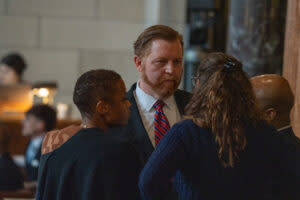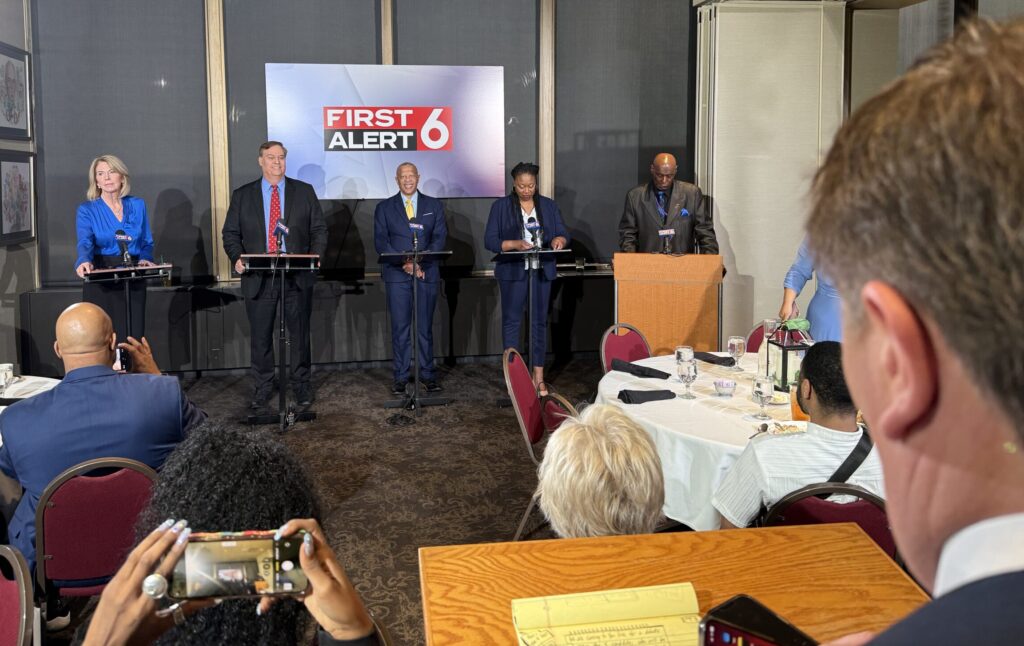Five candidates for Omaha mayor prepare for a debate in the city’s mayoral primary at the Omaha Press Club. Shown, left to right, are Omaha Mayor Jean Stothert, former State Sen. Mike McDonnell, Douglas County Treasurer John Ewing, nonprofit executive Jasmine Harris and community advocate Terry Brewer. March 11, 2025. (Aaron Sanderford/Nebraska Examiner)
LINCOLN — Lincoln and Omaha city officials would have the future option to move city elections and line them up with Nebraska statewide elections, under this year’s annual election cleanup bill.
Legislative Bill 521, from State Sen. Rita Sanders of Bellevue, advanced 42-0 on Thursday. Sanders, who chairs the Legislature’s Government, Military and Veterans Affairs Committee, said the goal is “modernizing” elections.
“This bill represents a significant investment in the integrity and efficiency of our electoral system,” Sanders said during debate.
Election cleanup package
LB 521 would make a series of changes, including to allow hospice or disability services patient records to count as a photo voter ID, stop petition signature verification of candidates or new political parties at 110% of the goal (similar to ballot measures), notify a voter if their voter registration is canceled, prohibit petition circulation within 200 feet of ballot drop boxes and permit the secretary of state to distribute petition pages to counties “by a secure method,” rather than just mail or by law enforcement.
State Sen. Rita Sanders of Bellevue. Dec. 10, 2024. (Zach Wendling/Nebraska Examiner)
Four other bills were amended into LB 521, by a 41-0 vote. They would:
-
Allow Lincoln or Omaha to move odd-year city elections in April and May to instead be in line with statewide primary and general elections (LB 19 from State Sen. John Cavanaugh of Omaha).
-
Exempt local foster care review boards from the Open Meetings Act (LB 238 from State Sen. Machaela Cavanaugh of Omaha).
-
Address situations where a public meeting notice has been sent to a newspaper but can’t be published on a proper timeline, and address what happens if a public notice can’t be posted online (LB 243 from Sanders).
-
Allow political parties to appoint watchers to monitor county election officials’ mandatory three independent tests of vote-counting devices. The results of the tests would later be published online (LB 659 from State Sen. Bob Andersen of north-central Sarpy County).
Andersen said his vote-counting reforms “reflect a commitment to election integrity and ensuring Nebraskans have confidence in the accuracy and security of our vote counting.”
LB 521 no longer includes a provision that could have allowed the secretary of state to use software, including artificial intelligence, to assist in processing a filed petition.
Omaha, Lincoln city elections

State Sen. John Cavanaugh of Omaha, center, meets with State Sens. Ashlei Spivey of Omaha, Danielle Conrad of Lincoln and Terrell McKinney of Omaha, from left. March 26, 2025. (Zach Wendling/Nebraska Examiner)
Sen. John Cavanaugh’s LB 19 is different from his introduced version, which would have required Omaha to move its off-year elections beginning in 2028. Under his amended bill, Omaha as well as Lincoln officials would have the option of putting a city charter amendment to a vote of residents to change the election timing.
The bill would not affect 2025 elections.
In odd-numbered years, Omaha primary elections are the first Tuesday of April, while general elections are the first Tuesday after the second Monday in May. For Lincoln, the general election is the first Tuesday in May, and the primary election is four weeks prior.
State law dictates the election timing for cities of the primary class (100,001 to 399,999 residents) and metropolitan size (400,000 or more residents).
This year, Omaha will have its general mayoral election May 13. Lincoln will have its city election May 6, but the mayor is not on the ballot until 2027.
Any city that changes to be in line with statewide election timing could change the point at which terms in office end, according to Cavanaugh. If not, and if, say, one of the cities had an election in November 2028, it could lead to a lame-duck public official for six months. Today, city terms in office start about four weeks after an election.
Cavanaugh said LB 19 would save property tax dollars, such as the $1.5 million Omaha is spending on this off-year election cycle, which he said would probably be a little less for Lincoln.
He said it also would help with voter fatigue after sometimes “grueling” statewide elections.
LB 521, a Government Committee priority for the year, faces up to two more rounds of debate.
Example timing for Lincoln/Omaha city elections under amended LB 521
City elections in Lincoln and Omaha are in odd-numbered years under existing state law, in contrast to the hundreds of other municipal elections statewide. Under Legislative Bill 521, as amended, officials would have the option to move city elections to even-numbered years.
Terms of office begin in 2025
-
Current law: Elected May 2025. Term in office June 2025 to June 2029. Next election April/May 2029.
-
City charter amendment is adopted (before 2028): Elected May 2025. Term in office June 2025 to June 2029, or sooner. Next election May/November 2028.
SUBSCRIBE: GET THE MORNING HEADLINES DELIVERED TO YOUR INBOX
Read the full article here


